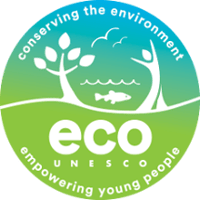
Between the 9th and 12th November 2014, ECO-UNESCO’s National Director Elaine Nevin attended the UNESCO World Conference on Education for Sustainable Development “Learning Today for a Sustainable Future” in Nagoya, Japan as the Irish delegate. Over one thousand people representing countries all over the world met for the the 4 day event which was attended by key UN representatives including Irina Bokova, the Secretary General of UNESCO, an address by Ban Ki Moon, the current Secretary-General of the United Nations as well as Japanese government and the crown Kōtaishi Naruhito Shinnō. A key note address was given by Princess Lalla Salma of Morocco. The Conference attracted delegates from Libya, Kenya, Sudan, Canada, China, Germany, Sweden, Palestine and Finland, amongst others; with 75 Ministers and a high level roundtable co-chaired by Irina Bokova, Director-General of UNESCO, and Hakubun Shimomura, Minister of Education, Culture, Sports, Science and Technology of Japan.
The UNESCO World Conference marked the end of the UN Decade of Education for Sustainable Development (2005-2015). The Conference celebrated the successes of the DESD (Decade Education for Sustainable Development), looked at lessons learned and at how we can re-orientate Education to build a better future for all.
‘ECO-UNESCO, as Ireland’s environmental education and youth organization affiliated to the World Federation of UNESCO Clubs, Centres and Associations is one of the leaders of ESD in Ireland and was delighted to attend this important conference. In particular as Ireland has published its National Strategy on ESD, this was a great opportunity to learn from and share with countries around the world. ECO-UNESCO’s many programmes including Youth for Sustainable Development; Global Youth Leaders for Change and the Young Environmentalist Awards promote ESD in Ireland’ commented Elaine Nevin. ‘Education is one of the key ways we can address global environmental challenges, such as Climate Change and food security. ESD examines the various social, economic and environmental factors that underpin poverty reduction, civic participation and governance both locally and globally. ECO-UNESCO in Ireland is looking forward to proactively promoting the Global Action Programme in Ireland,” she added.

Throughout the event there were more than 60 organizations committing to coordinate the over 30 Conference workshops, grouped under four clusters; Celebrating a Decade of Action, Reorienting Education to Build a Better Future For All, Accelerating Action for Sustainable Development and Setting the Agenda for ESD beyond 2014.
There were over 25 side events like Launching the 10 YFP sustainable lifestyles and education programme from UNEP (United Nations Environment Programme) and Education for Sustainable Development and disaster risk reduction programme from Kyoto University. Forming an integral part of the conference programme, a series of exhibits from around the world, showcased a wide variety of innovative practices and policy approaches to stimulate new ideas and new thinking around ESD. 25 successful ESD projects from groups including schools around the world were selected to present their work. Energy saving, sustainable living or greener economies were some of the areas chosen by the young people.
At the conference the Aichi Nagoya Declaration was adopted. This declaration calls for urgent action to mainstream ESD and include it in the post-2015 development agenda and calls on all nations to implement the Global Action Programme on ESD (GAP) to move the ESD agenda forward. In his closing remarks, Mr.Qian Tang, Assistant Director-General for Education at UNESCO said that ‘the declaration is instrumental in helping streamline education in national post-2015 development agendas. UNESCO has developed a new Global Action Programme (GAP) on ESD which seeks to generate and scale-up ESD action. ‘At the conference we were able to share successful initiatives from all over the world, to help government representatives and other key stakeholders formulate new goals and objectives. We have shaped these into a Roadmap for ESD that will implement the Global Action Programme” said Mr. Qian Tang.
The outcomes of the World Conference will inform the deliberations of the World Education Forum to be held from 19 to 22 May 2015 in Incheon, Republic of Korea.
To find out more about the conference log onto http://www.unesco.org/new/en/unesco-world-conference-on-esd-2014/


